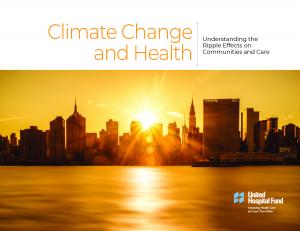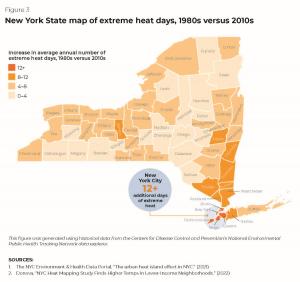United Hospital Fund Analysis Highlights Impact of Changing Climate on Health, Safety, & Livelihoods of NYers/Americans
Climate change amplifies health risks for the general population and for certain vulnerable groups in particular.”
NEW YORK, NY, UNITED STATES, September 16, 2025 /EINPresswire.com/ -- The changing climate is affecting the health, safety, and livelihoods of New Yorkers and all Americans, according to Climate Change and Health: Understanding the Ripple Effects on Communities and Care, a new report by United Hospital Fund (UHF) with analytic modeling and other expertise provided by Boston Consulting Group (BCG).— Oxiris Barbot, MD, President and CEO of United Hospital Fund
The climate is becoming hotter and less safe, according to the report, with the number of extreme heat days projected to double between 2005 and 2050 in New York City. The changing climate is having a serious and negative impact on people’s health and mortality as well as a range of other issues beyond physical health—such as housing, health care costs, wages, and more. By 2050, the ripple effects of climate change are estimated to include up to $45 billion in health care costs and up to $250 billion in lost wages across the U.S.
“Our analysis clearly shows that shifts in the climate can affect health in very direct ways, sometimes leading to acute injuries and other times impairing the body’s ability to regulate itself,” says Oxiris Barbot, MD, President and CEO of United Hospital Fund. “While climate change can pose a risk to anyone’s health, whether you live in an urban or a rural area, its impacts are amplified for communities who are already facing socioeconomic challenges or vulnerable individuals like those who are pregnant, have a chronic health condition, or are elderly.”
The new analysis leverages existing climate models, historical climate and health data, and scientific literature to estimate past and future health trends in the U.S., New York State, and New York City—and to better understand the effects of climate change on individuals and communities.
Major findings and data in the report include:
The Climate is Changing—Becoming Hotter and Less Safe
• The number of days of extreme heat (over 90°F) has increased from approximately 11 days in the early 2000s to around 15 days today, while extreme precipitation in the Northeastern U.S. has increased 71% since the 1950s.
• In New York City, the number of extreme heat days is projected to approximately double from 17 days in 2005 to between 35 and 45 days in 2050.
• Canada's climate change-driven wildfires in 2023 caused a measure of air pollution known as PM2.5 concentration in the Northeastern U.S. to exceed World Health Organization safety guidelines by 17 times.
The Changing Climate is Negatively Affecting Health
• In New York State, the heat-exacerbated mortality rate is double the U.S. population average for adults ages 65+ and five times higher for adults ages 85+.
• Black New Yorkers in New York City died at twice the rate of white New Yorkers due to directly attributed heat deaths from 2013 to 2022.
• By 2050, New York State is projected to see more than 22,000 new Lyme disease cases, accounting for 30% of U.S. incidence, driven by warmer, wetter conditions that are favorable for disease-carrying vectors.
• Across the U.S., up to 680,000 additional people may experience asthma associated with air pollution in 2050 relative to 2025.
Climate Change Has Ripple Effects Beyond Physical Health—on Housing, Health Care Costs, Wages, and More
• Extreme weather events have destroyed housing, interrupted electricity access, and caused agricultural losses in New York State.
• Based on current costs in 2025, the ripple effects of climate change in 2050 are estimated to include up to $45 billion in health care costs and up to $250 billion in lost wages across the U.S.
• In New York State, the current combined costs of climate-related health events and lost wages due to excess heat are estimated to be two to three times higher than those associated with the flu.
“Beyond climate change’s direct impact on the health of individuals, it can also indirectly affect social drivers of health, like stable housing, food, energy, transportation, and other essential resources,” said Dr. Barbot.
The new report includes 18 detailed charts, graphs, and maps. It also includes several recommended interventions to address near-term health impacts while also building long-term resilience and adaptive capability. These interventions include decarbonization, fostering resilience at the community level, innovating to address social drivers of health, and educating providers, patients, and caretakers.
The report was written by Amy Lin of United Hospital Fund. The Boston Consulting Group team created the analytic model and provided other expertise through a pro bono engagement. United Hospital Fund and BCG has collaborated on a series of "ripple" effect" reports, including The Ripple Effects of the Adolescent Behavioral Health Crisis: Recent Trends and Impacts on American Adolescents, Families, and Society (2024), The Ripple Effect of Firearms: How Families, Communities, and Society in the U.S. Are Affected by Firearms (2023), COVID-19 Ripple Effect: The Impact of COVID-19 on Children in New York State (2020), and The Ripple Effect: National and State Estimates of the U.S. Opioid Epidemic’s Impact on Children (2019).
About United Hospital Fund--United Hospital Fund works to build an effective and equitable health care system. An independent, nonprofit organization, we are a force for improvement, analyzing public policy to inform decision-makers, finding common ground among diverse stakeholders, and developing and supporting innovative programs that improve health and health care. We work to dismantle barriers in health policy and health care delivery that prevent optimal opportunities for health. For more on our initiatives and programs please visit our website at www.uhfnyc.org.
Mary Johnson
United Hospital Fund
+1 212-494-0734
email us here
Visit us on social media:
LinkedIn
Bluesky
Instagram
Facebook
X
Other
Legal Disclaimer:
EIN Presswire provides this news content "as is" without warranty of any kind. We do not accept any responsibility or liability for the accuracy, content, images, videos, licenses, completeness, legality, or reliability of the information contained in this article. If you have any complaints or copyright issues related to this article, kindly contact the author above.



